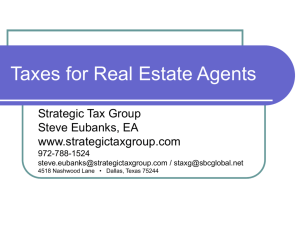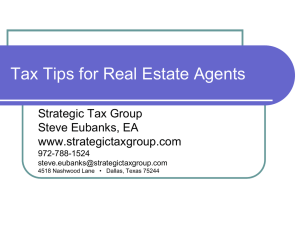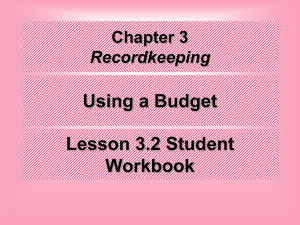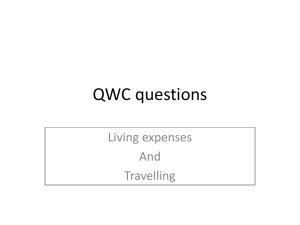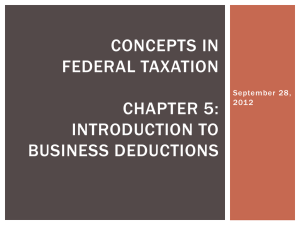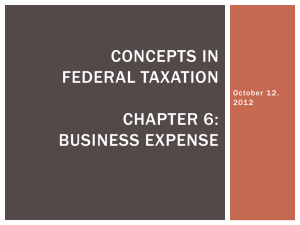- Peachtree City Accountants
advertisement
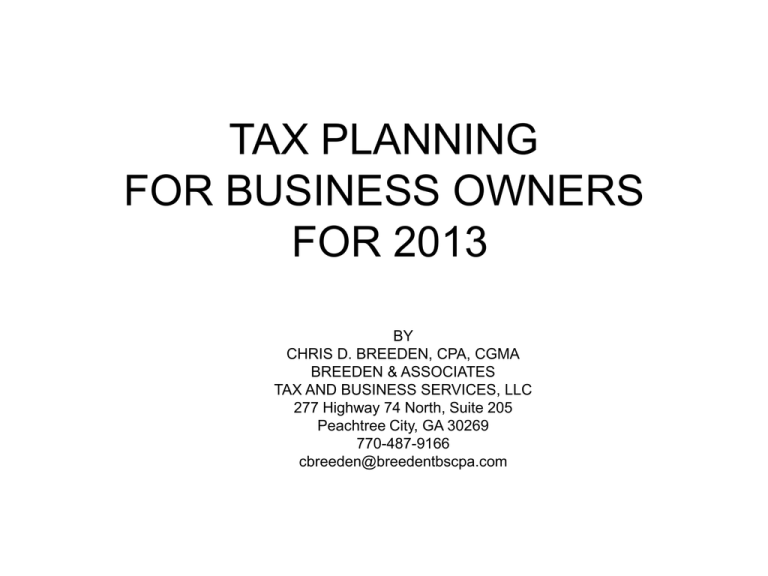
TAX PLANNING FOR BUSINESS OWNERS FOR 2013 BY CHRIS D. BREEDEN, CPA, CGMA BREEDEN & ASSOCIATES TAX AND BUSINESS SERVICES, LLC 277 Highway 74 North, Suite 205 Peachtree City, GA 30269 770-487-9166 cbreeden@breedentbscpa.com ENTITY SELECTION • SOLE PROPRIETORSHIP – FILE SCHEDULE C WITH FORM 1040 (DUE APRIL 15) • SUBCHAPTER S CORPORATION – FILE FORM 1120-S (DUE MARCH 15) • PARTNERSHIP – FILE FORM 1065 (DUE APRIL 15) • LLC (LIMITED LIABILITY COMPANY) COMMON EXPENSES • Advertising Costs – Signs, newspaper advertising, flyers, online advertising, post cards, promotional materials and anything else tht was used to market your business may be deductible • Professional Fees – Your Professional Dues, License Renewal, E&O Insurance, and any other professional fees you incur may also be deductible • Education Materials – Any continuing education classes or seminars, books, magazines, etc. • Office Equipment – Office equipment can include desk fees if you have them at your office, computer/software, phone fees (including cell phone), cameras, office supplies, and anything else related to necessities of running your office. MEALS & ENTERTAINMENT • Meals, sports tickets and other entertainment • Must have documentation for the expense, including statement of the business purpose, names of the person being entertained, date and location • Generally only 50% of business meal and entertainment expenses can be deducted • Must discuss business either before, during or after entertainment CAR/DRIVING EXPENSES • Car/Driving Expenses – This is an obvious one most agents remember but many often get confused about how much mileage they can deduct or how to separate “personal” and “business use” – Actual Expenses – You may deduct the actual expenses of operating your car for business. This includes gas, insurance, repairs, maintenance, license and depreciation – Standard Mileage Rate – You can simply multiply your business miles driven during the year by the IRS standard rate for the year which is 56.5 cents per mile for 2013 – Other Expenses – Some auto expenses you are allowed for either method are parking fees, tolls, interest expense – Track Mileage – Total miles (business and personal) BUSINESS USE OF HOME • To deduct expenses for business use of the home, part of your home must be used regularly and exclusively as one of the following: – The principal place of business for your trade or business – The place whre you meet and deal with your patients, clients or customers in the normal course of your trade or business, or – In connection with your trade or business, if you use a separate structure that is not attached to your home BUSINESS USE OF HOME (CONTINUED) • Where the exclusive use requirement applies, you cannot deduct business expenses for any part of your home that you use for both personal and business purposes. For example, if you are a real estate agent and you use the den of your home to make appointments and also for personal purposes, you may not deduct any business use of your home expenses. Further, under the principal place of business test, you must determine that your home is the principal place of your trade or business after considering where your most important activities are performed and most of your time is spent, in order to deduct expenses for the business use of your home. BUSINESS USE OF HOME (CONTINUED) • Deductible expenses for business use of your home include the business portion of real estate taxes, deductible mortgage interest, rent, casualty losses, utilities, insurance, depreciation, maintenance and repairs. • Business portion is calculated using the square footage of the office compared to the square footage of the entire house. • Simplified method of calculating home office deduction for 2013. Calculated by taking the allowable square footage (not to exceed 300 square feet) times $5/square foot. Maximum deduction is $1,500. IRS may revisit this in the future. RETIREMENT ACCOUNTS • • • • SIMPLE IRA SEP KEOGH SOLO 401K ITEMS TO NOT OVERLOOK • • • • • • As a self-employed taxpayer, you are permitted to take a special “abovethe-line” deduction for the health insurance premiums you pay for yourself and your family. If you have items used partly for business and partly for personal, you may deduct the business use portion. You can elect to expense a certain amount of equipment costs in the year of purchase (Sec. 179 deduction). Any amount you expense reduces your tax basis for depreciation. Hire your children. If you need help in your business, consider hiring your children. The wages you pay will be deductible by you and taxable to your children in their presumably lower tax brackets. Wages paid to your children under age 18 are not subject to payroll taxes unless you operate a corporation. Hire your spouse. If your spouse accompanies you on a business trip for valid business purposes, you can deduct his or her expenses along with your own. You may be able to set up benefit plans as well for your spouse. Don’t miss the self-employment tax deduction you are allowed which is 50% of the self-employment tax you pay. ESTIMATED TAX PAYMENTS • DUE DATES ARE – – – – April 15 June 15 September 15 January 15 • UNDERPAYMENT PENALTY – If you do not pay the proper amount of quarterly payments or make the payments late – Your payments should equal the smaller of 90% of the tax to be shown on your current year tax return or, 100% of the tax shown on your prior year tax return – Each estimated payment should be 25% of the total amount – Late or inadequate payments mean you will be assessed penalty and interest charges in addition to your income tax liability RECORD KEEPING • Good record keeping is essential, not only for tax reporting purposes, but also for your success as a real estate agent. • Record keeping systems – Filing system for receipts and documents • Paper • Electronic • Bookkeeping System – – – – QuickBooks Spreadsheet Notebook (paper) Record weekly, bimonthly, monthly, quarterly AUDIT RISKS • Declaring no or very little income with large expenses • Not keeping adequate records especially for mileage and entertainment expenses • Not working enough hours in the business so IRS declares it a hobby • Not filing proper tax forms such as 1099’s, payroll tax forms if required, appropriate schedules to individual income tax return NEW FOR 2013 • Higher income tax rates • Health Care Changes Causing Different Taxes (increased Medicare tax, penalties for no health insurance) • Phaseout of itemized deductions for high income taxpayers • Phaseout of personal exemptions for high income taxpayers • Higher capital gains tax rate for high income taxpayers SUMMARY Always take a sensible approach when it comes to tax planning. Your business activities and purchases should have economic merit without the tax considerations. However, taxes are a fact of life. The truth of the matter is that a little planning can often save a lot of money.
